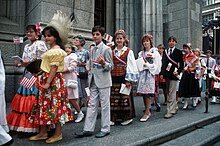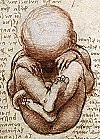
| Part of a series on |
| Human growth and development |
|---|
 |
| Stages |
| Biological milestones |
| Development and psychology |
A child (pl. children) is a human being between the stages of birth and puberty,[1][2] or between the developmental period of infancy and puberty.[3] The term may also refer to an unborn human being.[4][5] In English-speaking countries, the legal definition of child generally refers to a minor, in this case as a person younger than the local age of majority (there are exceptions like, for example, the consume and purchase of alcoholic beverage even after said age of majority[6]), regardless of their physical, mental and sexual development as biological adults.[1][7][8] Children generally have fewer rights and responsibilities than adults. They are generally classed as unable to make serious decisions.
Child may also describe a relationship with a parent (such as sons and daughters of any age)[9] or, metaphorically, an authority figure, or signify group membership in a clan, tribe, or religion; it can also signify being strongly affected by a specific time, place, or circumstance, as in "a child of nature" or "a child of the Sixties."[10]
- ^ a b "Child". TheFreeDictionary.com. Retrieved 5 January 2013.
- ^ O'Toole, MT (2013). Mosby's Dictionary of Medicine, Nursing & Health Professions. St. Louis MO: Elsevier Health Sciences. p. 345. ISBN 978-0-323-07403-2. OCLC 800721165. Wikidata Q19573070.
- ^ Rathus SA (2013). Childhood and Adolescence: Voyages in Development. Cengage Learning. p. 48. ISBN 978-1-285-67759-0.
- ^ "Child". OED.com. Retrieved 11 April 2023.
- ^ "Child". Merriam-Webster.com. Retrieved 11 April 2023.
- ^ "When Is It Legal For Minors To Drink?". Alcohol.org. Retrieved 31 May 2024.
- ^ "Children and the law". NSPCC Learning. Retrieved 31 May 2024.
- ^ "23.8: Adulthood". LibreTexts - Biology. 31 December 2018.
A person may be physically mature and a biological adult by age 16 or so, but not defined as an adult by law until older ages. For example, in the U.S., you cannot join the armed forces or vote until age 18, and you cannot take on many legal and financial responsibilities until age 21.
- ^ "For example, the US Social Security department specifically defines an adult child as being over 18". Ssa.gov. Archived from the original on 1 October 2013. Retrieved 9 October 2013.
- ^ "American Heritage Dictionary". 7 December 2007. Archived from the original on 29 December 2007.